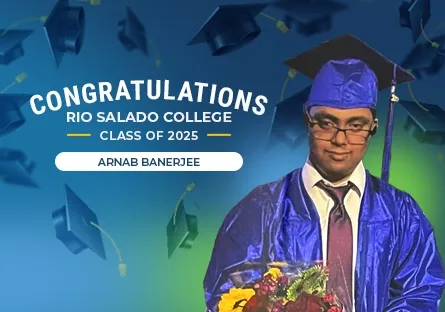
The human brain is not a muscle but often behaves like one. Through rigorous study and practice, you can improve your cognition over time. Flexing neurons like muscles, building up mental capacity, getting “swole” above the neck— pumping iron by hitting the books. Class of 2025 Rio Salado College graduate Arnab Banerjee has devoted as much time to strengthening his mental “muscles” as he has to honing his physique in the gym.
Originally hailing from Mesa, Arizona, Banerjee works at a gym in Chandler while pursuing his education part-time. In his time at Rio Salado College, he’s racked up an impressive array of brain-flexing credentials that includes three certifications in Sustainable Food Systems and an Associate of Applied Science in Sustainable Food Systems. These accomplishments are even more impressive considering both his familial obligations and his demanding work and training schedule— Banerjee often wakes at 4 a.m. and trains at the gym and at home until late at night.
“One of the main reasons I chose Rio Salado College was because of its flexible online learning options,” Banerjee said. “I am a working parent, and the ability to log into my classes at my own pace and on my own schedule was crucial for me. This flexibility allowed me to balance my work and family responsibilities while still pursuing my education.”
Banerjee’s close family ties motivated his desire for continuing his education at Rio Salado, which the grad said "felt like home”.
“My mom encouraged me to take courses there during COVID to enhance my cognitive thinking and learn about sustainability,” Banerjee said. “I thought that Rio would make me become a notable person that would help change the way I study.”
Banerjee’s dedication to self-improvement at the gym gave him a strong work ethic to apply to his studies.
“Whether it involves rigorously training my physique around the clock or diligently focusing on academic pursuits, I consistently allocate time to study with increased efficiency and intelligence. I set tasks depending on my priorities and rank them based on importance and discipline.”
When asked what tips he would offer students who are new to online learning, Banerjee emphasized the importance of self-determination.
“Trust your instincts. Go with your gut. If your gut tells you something is right, go for it. Don’t give up. Failure is not acceptable. Listen to your teachers and professors. Study efficiently.”
While that may sound like some serious, it’s-time-to-grind advice, Banerjee also highlighted the freedom and fun of online classes.
“Taking online classes was really easy,” Banerjee said. “I could just sit at home and study on my own time. I personally loved it.”
One of Banerjee’s favorite courses inspired him to spend more time out of the house and away from the gym, enjoying the splendors of nature: “The Humanities course Sustainable Ethics really inspired me to be out in nature even more and study aspects of wildlife.”
Banerjee was drawn to sustainability as an area of study for several reasons.
“Not only am I passionate about food but I also believe that we can make a difference in making our planet a sustainable place by teaching other students and the whole community about practices that will help us grow our own food,” Banerjee said. “The program also taught us ways to study the methods of accessing potable water sources.”
The Rio grad plans to continue his studies at Arizona State University toward a bachelor’s degree in Sustainability. His time at Rio prepared him well for his current and future paths, he said.
“The Associate of Applied Science in Sustainable Food Systems helped prepare me for my future by giving me the opportunity to teach people the importance of taking care of the food industry and how it involves sustainable practices to keep people and the planet safe.”
Article by Austin Brietta
Meet The Class of 2025
Interested in learning more about this year’s graduates? Check out some of our other student profiles from this year’s Commencement.